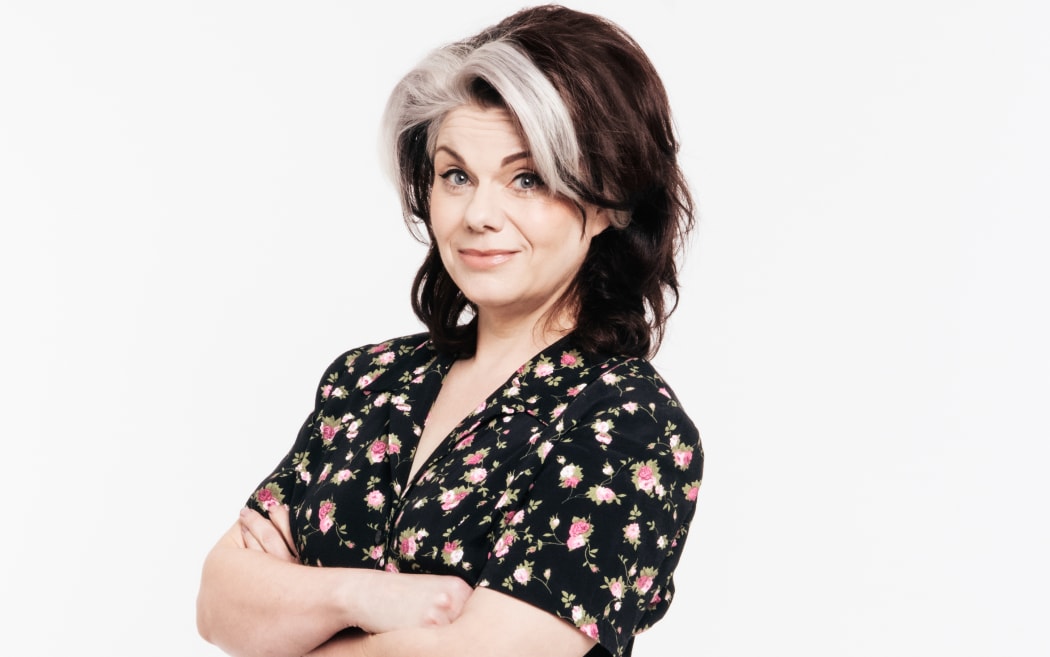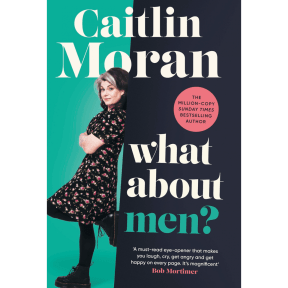
Photo: ALEX LAKE
"Heartbreaking" is the word Caitlin Moran found herself repeating while researching her latest book What About Men?
After ten years "trying to sort out the women" best-selling UK writer Caitlin Moran has turned her attention to the crisis of masculinity.
"I used to sit there sometimes typing and crying and thinking 'Poor boys, poor men. How did we forget that this is half the world and they're our brothers and we need to help them as well?" she tells Kim Hill.

Photo: Penguin Books New Zealand
Moran was giving a presentation to some teenagers on International Womens Day two years ago when she became aware of how deeply today's boys and men are struggling with how to be.
The boys in the group "hijacked" Moran's talk, she says, to angrily tell her that feminism had gone too far and they were now worse off than their female peers.
Knowing that "anger is just fear brought to the boil", Moran wanted to know more.
"How can teenage boys be scared of the girls and how can they say women are winning? Because by any measure, women still aren't winning. We've progressed but we're still not equally represented in sports and politics and the economy, the pay gap still exists and we all know one in four of us will be sexually assaulted or raped, so how can you think women are winning?"
The only thing today's girls have that boys do not is feminism, she realised.
"We have spent these last 15 years celebrating women, creating these incredible networks, talking about their problems … and boys have had not had that. There is no sense of hope and uplift and change. No one is saying 'the future is male'.
"I thought 'oh, okay. I need to clear my projects for the next couple of years. This is the next book indeed to write. We've kind of taken our eye off the ball a bit here. There is a generation of boys we've kind of forgotten to talk about."
Moran can understand why teenage boys raised in a world where they frequently hear about the toxicity of masculinity would be drawn to the messaging of controversial influencers like Andrew Tate and Jordan B Peterson.
For What About Men? she spent a lot of time researching online misogyny and the so-called manosphere.
Many young men told Moran they felt nihilistic and desperate about not having a girlfriend. She says this sense of isolation is partly because boys have been taught that a girlfriend is the only person they'll get to be emotionally vulnerable with.
"So if you don't have a female partner not only are you alone and you are not loved but there's nowhere to emotionally vent. You are literally trapped in your own thoughts."

Photo: Adrian Swancar / Unsplash
It would be helpful if women could share with men some of the things, such as positive expressions of gender solidarity, that have helped them succeed, Moran says. But in 2023, many people seem uncomfortable with the idea of celebrating masculinity at all.
''How have we not yet found the tone to be able to celebrate men that doesn't immediately make some people feel scared or want to react or be angry? That's the problem in a nutshell. We need to find a new conversational tone that doesn't make people feel angry or threatened but feels as simple and joyful and honest and celebratory as the way that we have learned to talk about women and girls."
It's in the best interest of girls and women to help fix boys and men, Moran says.
"As any woman knows, half the problems with being a girl or a woman are men – men who are scared, men who are sad, men who are abusive, men who can't talk about their problems… It's absolutely an extension of my feminism, that having tried to fix the girls we now try and fix the boys."
Although a new Caitlin Moran book is usually met with something like "Hooray, Caitlin's written another lovely book, we really like this, thanks", the reception to What About Men? has been dramatically different, she says.
Since the book was announced, she's been the recipient of "two weeks of anger and abuse" on social media, mostly from men, with about half saying 'how dare you say men aren't emotionally literate?' and the other half saying 'Why are you trying to turn men into women?'
Privately, she's also hearing from male friends in the creative industries who commend her for writing a book about men that no man could have gotten away with writing.
"[They said] 'Can you imagine if a man had of written a book going 'here are men's problems and we need to celebrate men'? A woman had to write it. I know you're really not enjoying the abuse you're getting but it's far less abuse than a man would have had if he'd written this book'.
"It was very sobering to me, and I think they're right… I think [the backlash] would have been worse for a man."
Caitlin Moran's best-selling non-fiction books include How To Be A Woman, More Than A Woman, Moranthology and Moranifesto.
Related:
The toxic world of the manosphere
When influencers are not a good influence
Redefining masculinity to help men thrive

